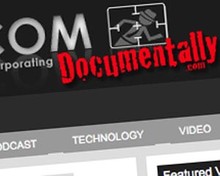
He is a hard man to pigeonhole and that's perhaps one of the reasons for his success.
"I asked people online what [they think] I do for a living and I got loads of responses: one was that I was a 'social media provocateur'," he says.
"I inspire people to 'ask themselves what they are doing', by interviewing them or talking to them in a social media sense," he tells Journalism.co.uk in an interview – arranged through Twitter – at an event for the Webby Awards.
"I would call myself a social media mongrel and I like to be a jack of all trades within this brave new world. I like to show by doing, without actually knowing," he adds.
The career of a photographer found Payne, rather than the other way around, he says, when an in-flight magazine picked up a photo he took of a hotel fire in Bangkok - fought by a young child in a fireman's uniform.
"I travelled for 10 years, finishing in 1999. The reason is [that] I took some photographs that someone bought. I suddenly realised that I could make money out of making media. I didn't have a clue what I was going to do for a living before that," he says.
"I came back to England, walked into a newspaper [the Rugby Observer] and said I was a photographer. This was at the time that their photographer had just broken both of her arms in a car accident.
"They said to me, 'when can you start?' I said, 'tomorrow, if you let me have the camera tonight'."
Payne later spent two years on daily newspapers in Northamptonshire; at this time he realised there were some fundamental problems with how the 'traditional' publishing model worked.
"It taught me how there were too many people involved in the editing, there was too much of a distance between the capturing of the media to the publishing of the media," he says.
This was the push he needed to 'go it alone', to become a freelancer – but with a twist. An early adopter of new technologies and tools, Payne used podcasts, blog posts (before they were called blog posts) and websites to talk about his work.
"PR companies saw that [me] talking about the stuff I was doing and photographing, got more of an awareness than the photographs I was making. Social media for me was born then," he explains.
Technology like that 'enables you to speak to a mass, a wider audience,' he explains. "Using tools to get the message out there is my priority and prerogative," he adds.
"Any website, any tool that I can use easily, like Phraedz, like Qik, like Twitter, I will use indiscriminately - whether or not they can be tied together."
This morning [Monday] saw Payne join a team of bloggers and social media enthusiasts, who used these very tools to cover a Reuters Q&A session with Conservative party leader David Cameron.
Shortly before our interview last week, Payne had tried to film the politician, who was attending a private party in the same building, by using his press pass to gain access. Traditional tools still have their uses – it was the Che Guevara-style avatar on his chest that got him denied entry, he jokes.
"Going freelance as a member of the National Union of Journalists (NUJ), [made me realise] that saying I was a journalist got doors opened and I got work that way," he explains.
Payne sees himself as a citizen journalist and passionate about what he covers, producing non-profit making reports on top of his daily workload.
"I deserve to be called a citizen journalist, because I've reclaimed my citizenship from the newspapers, who owned me at some point. I have no affiliation now," he says.
"I still want to report the truth and just because I'm not tied to a label as respected as the Guardian, doesn't mean I can't speak the truth."
While freelancers and citizen journalists may be more open to social media, they're not necessarily looking to make money from it, he adds.
"They [profit-making publishers] want to control the media because they're getting paid for that. You've got to remember that there isn't necessarily a business model for people doing citizen journalism," he suggests.
The reporting Payne does across various social media channels may not earn him money, but it does help build his reputation and credibility, indirectly earning him work, he says.
"Anything I report in my streams I'm not getting paid for – which is probably why people like what I'm doing," he says.
"As soon as somebody can see that you're passionate in what you do, they will hire you for what you do.
"To a certain extent he who shouts loudest does get heard. But you can be shouting angrily and people will ignore you, or you can be shouting 'I love what I'm doing' and people say, 'can you come and do that for us?'"
Free daily newsletter
If you like our news and feature articles, you can sign up to receive our free daily (Mon-Fri) email newsletter (mobile friendly).
Related articles
- Seven tips for using LinkedIn as a freelance journalist
- Journalists are happy to be disconnecting from platforms, should news organisations be worried?
- Protecting journalists on social media, with Valérie Bélair-Gagnon
- What will your audience want in the future?
- 15 free sources of data on the media industry









